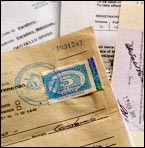 Just how far does the information exception to our economic sanctions programs go? Of course, the traditional response from the Office of Foreign Asset Controls (“OFAC”), the agency that administers the U.S. economic sanctions regimes, is usually “Not very far.” The issue, here, is whether a particular activity is an export of information or an export of services (or some combination of the two.) Sometimes OFAC has tried to draw the distinction by saying that the exception does not apply to information not already in existence, although it makes a somewhat unaccountable (although welcome) exception for magazine subscriptions.
Just how far does the information exception to our economic sanctions programs go? Of course, the traditional response from the Office of Foreign Asset Controls (“OFAC”), the agency that administers the U.S. economic sanctions regimes, is usually “Not very far.” The issue, here, is whether a particular activity is an export of information or an export of services (or some combination of the two.) Sometimes OFAC has tried to draw the distinction by saying that the exception does not apply to information not already in existence, although it makes a somewhat unaccountable (although welcome) exception for magazine subscriptions.
So where does this new Cuban document retrieval service fall? The service advertises that it uses “proprietary” means to retrieve Cuban birth certificates and other official certificates for people in the United States. Retrieving these documents from Cuban archives seems to pose few problems. But the service doesn’t stop there:
All documents retrieved from Cuba for any official use (Cuban passport, driver’s license and marriage applications etc) need to be “legalized” in Cuba in order to be recognized as an official document.
The certificates we provide are legalized with stamps and seals from the Ministerio de Relaciones Exteriores also known as MINREX.
Adding the legalization stamps, seals and other government doohickeys may be what steps over the line, because the retrieval company is not just exporting information already in existence but is taking existing information and providing services to alter it.
Section 515.545 of the Cuban Assets Control Regulations also seems to suggest that the legalization process may be one step too far:
This section does not authorize the remittance of royalties or other payments relating to works not yet in being, or for marketing and business consulting services, or artistic or other substantive
alteration or enhancements to informational materials
The company has said that this plan has been blessed by its lawyers and that they are not obtaining licenses for these transactions. I suppose that in the end the issue is whether the legalization of the document is or is not a “substantive alteration or enhancements.” I would be disinclined to opine to a client on that matter without at least some informal discussions with OFAC. So, I’m assuming that someone in OFAC likely provided at leat an informal reaction to the retrieval plan.
[Posting has been light lately due to demands at work This week my normal posting schedule ought to resume.]
 Permalink
Permalink
Copyright © 2011 Clif Burns. All Rights Reserved.
(No republication, syndication or use permitted without my consent.)

 Posted by
Posted by  Category:
Category: 

